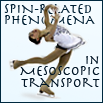Speaker
Kalarikad Thomas
Description
Transport in quantum wires has attracted wide interest since
the discovery of conductance quantization in 1988. Apart
from this single-particle phenomenon, interest in quantum
wires has steadily grown due to theoretical predictions that
at low densities electron-electron interactions may lead to
many different effects such as Luttinger liquid phenomenon,
Wigner crystallization, spin polarization gas etc. While
direct observation of a Luttinger liquid was found to be
elusive in transport experiments, spin-related effects such
as the 0.7 structure and zero bias conductance anomaly in
ballistic quantum wires are believed to be due to
interactions. A lot of theoretical models were proposed to
explain the 0.7 structure [1] including spin polarization,
Kondo effect, spin-incoherent transport, and Wigner
crystallization. One of the important experimental
breakthroughs came after predictions [2] that a tunable
confinement potential which competes with the interaction
strength may shine light on the origin of the 0.7 structure.
Quantum wires were fabricated with an additional top gate to
examine the effect of confinement strength and density. We
have reported a bifurcation of the 1D electron gas in to two
spatial rows as a possible consequence of a weakening
confinement and increasing interaction strength [3,4]. Our
recent experiments indicate that a zig-zag configuration is
formed in the wire before the onset of the double-row
formation. In this talk we shall present some of the recent
experiments in this regime of transport with emphasis on the
implications of lowering confinement strength on the 0.7
structure.
1. K. J. Thomas, J. T. Nicholls, M. Y. Simmons, M. Pepper, D. R. Mace, and D. A. Ritchie. “Possible Spin Polarization in a One-Dimensional Electron Gas”, Phys. Rev. Lett. 77,135 (1996)
2 .A. D. Klironomos, J. S. Meyer, T. Hikihara and K. A. Matveev, ‘Spin coupling in zigzag Wigner crystals’, Phys. Rev. B 76, 075302 (2007).
3. W. K. Hew, K. J. Thomas, M. Pepper, I. Farrer, D. Anderson, G. A. C. Jones, and D. A. Ritchie, “Incipient Formation of an Electron Lattice in a Weakly Confined Quantum Wire”, Phys. Rev. Lett., 102, 056804 (2009).
4. L. W. Smith, W. K. Hew, K. J. Thomas, M. Pepper, I. Farrer, D. Anderson, G. A. C. Jones, and D. A. Ritchie, “Row coupling in an interacting quasi-one-dimensional quantum wire”, Phys. Rev. B., 80, 041306® (2009).
1. K. J. Thomas, J. T. Nicholls, M. Y. Simmons, M. Pepper, D. R. Mace, and D. A. Ritchie. “Possible Spin Polarization in a One-Dimensional Electron Gas”, Phys. Rev. Lett. 77,135 (1996)
2 .A. D. Klironomos, J. S. Meyer, T. Hikihara and K. A. Matveev, ‘Spin coupling in zigzag Wigner crystals’, Phys. Rev. B 76, 075302 (2007).
3. W. K. Hew, K. J. Thomas, M. Pepper, I. Farrer, D. Anderson, G. A. C. Jones, and D. A. Ritchie, “Incipient Formation of an Electron Lattice in a Weakly Confined Quantum Wire”, Phys. Rev. Lett., 102, 056804 (2009).
4. L. W. Smith, W. K. Hew, K. J. Thomas, M. Pepper, I. Farrer, D. Anderson, G. A. C. Jones, and D. A. Ritchie, “Row coupling in an interacting quasi-one-dimensional quantum wire”, Phys. Rev. B., 80, 041306® (2009).

